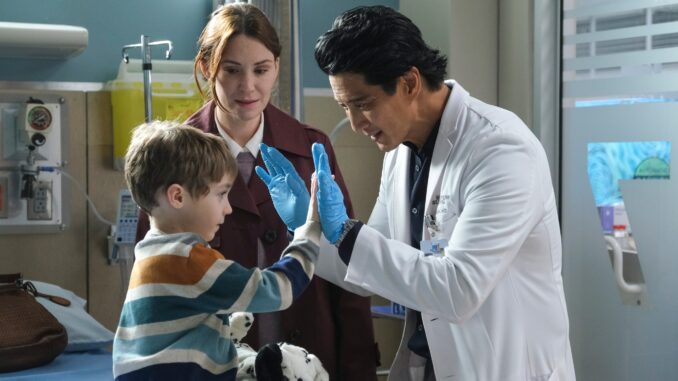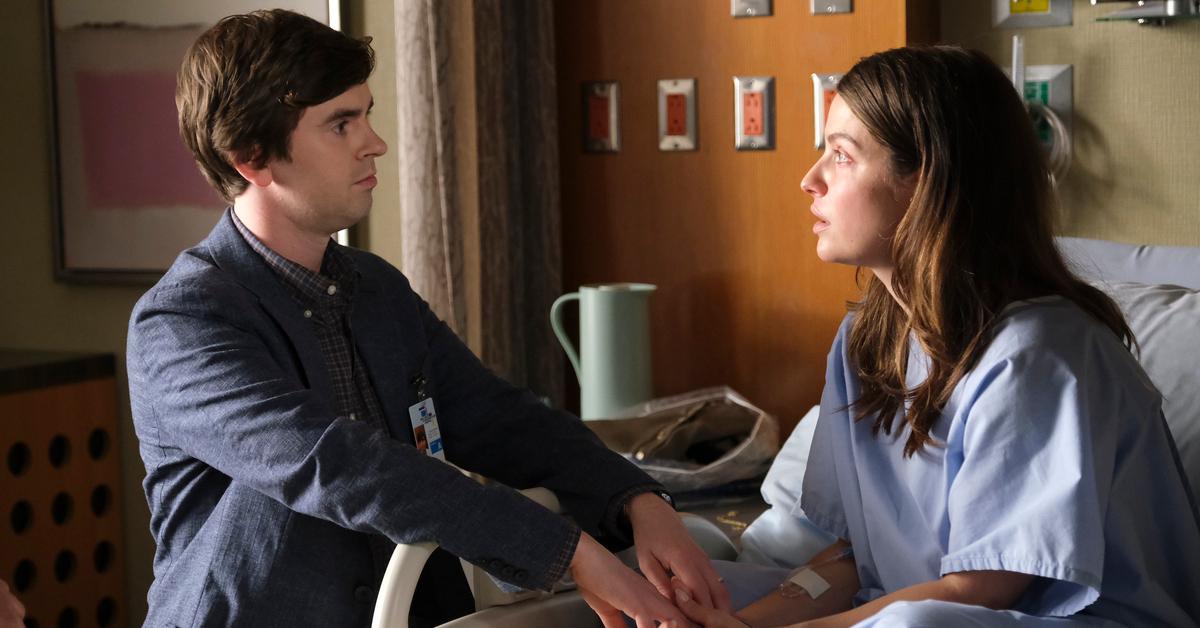
One of the biggest and frankly most surprising stories of the new TV season is the ratings success of the new ABC drama The Good Doctor. From the creator of House and starring Freddie Highmore (fresh off of Bates Motel), the show is about a young surgical resident with autism and savant syndrome. With TV bleeding ratings in all corners (sorry about it, The Walking Dead), any new success story is rare, and doubly so on networks. So with The Good Doctor‘s ratings climbing up past The Big Bang Theory to claim the title of most viewed TV program of the week, it’s time to start paying attention.
When a CBS show becomes a ratings hit, nobody really questions it. It gets chalked up to older viewers still tethered to their cable boxes or some kind of vague CBS magic. Les Moonves and his pocketful of magic beans. But when another network scores a hit, it’s a scramble to figure out what they did right. Which is why we spent the better part of last year wondering why This Is Us was such a ratings behemoth (I think we settled on “people love to cry”?). So now we have to ask: why do people like The Good Doctor? Honestly. Seriously. Why?
This kind of thing is less of a question when the hit show in question is well- or at least moderately-received by TV critics. This Is Us isn’t Breaking Bad when it comes to TV reviews, but it was well-regarded enough to win Best New Program at the Television Critics Association awards in August. The Big Bang Theory can seem like a punching bag on Twitter, but there was a while there when critics where championing it as a better-than-you-think-it-is multi-camera sitcom. But the reviews for The Good Doctor have been heavily awful. Variety‘s Maureen Ryan summed it up:
The problem with “The Good Doctor” is that it doesn’t trust Highmore’s versatile and substantial acting skills. Every other aspect of the show is either overwrought or frustratingly simplistic, as if it’s determined to get the viewer to care about Shaun by hook or by crook. But Highmore makes the viewer care, thanks to his intense presence and precise portrayal. Unfortunately, the actor can’t undo the flat writing and one-dimensional elements in the show’s unpromising pilot.

But while the critics aren’t into it, clearly somebody is. Lots of somebodies! But why? Like the true TV snob I am, I haven’t been watching. Just kidding, I’m not snob — I like some real trash! — but there is a lot of TV, and the Freddie Highmore autistic-doctor show didn’t cross my threshold. But I set out to investigate for myself. I skipped the pilot episode; pilots are bad, and the pilot is what all those TV critics hated anyway. Maybe it got substantially better in its fourth and fifth episodes in a way only its fans saw coming? Only one way to find out!
So after catching up with episodes 4 and 5 of The Good Doctor, I’m ready to test a few theories as to why it is so popular. If we all keep an open mind, we can hash this out together.
1. America Loves Freddie Highmore’s Bizarrely Captivating Face: In Mo Ryan’s above-linked review, Highmore is a highlight. (Okay, if you don’t like that one, know that I could have written, “she clearly wanted more Highmore.”) He’s an actor who’s worked hard to get to this platform. His big break came in the Oscar-nominated Finding Neverland, a film so bland that when I saw it in the theater, the house lights stayed on, and nobody in the audience cared enough to ask someone to turn them down. But after five critically acclaimed seasons playing Norman Bates on Bates Motel, Highmore is overdue for a popular hit. His performance style is … I’m going to say “not for everyone”? He’s intensely committed to playing Dr. Shaun Murphy’s autism, and the effect can be a lot. It’s comparable to Hugh Laurie in House in that they’re both British actors holding down their accents with both hands, but where Dr. House was freely abrasive, Highmore’s Shaun Murphy is controlled to an almost uncomfortable degree. Highmore’s face is absolutely the most interesting thing happening on the screen at all times; whether it makes you too anxious to function or not is in the eye of the beholder.

2. America Needs Its Problems to Get Solved, Explained: This has been the rationale for the success of procedurals since time immemorial, but it feels especially applicable in 2017, which experts say is the 2017-iest year on record. At a time when all problems seem insurmountable and everybody hates each other too much to come to any solutions, it is undeniably comforting to watch a show that not only features a kind-hearted pure soul diagnosing even the more obscure ailments, but doing so with the authority of textbook diagrams projected on the TV screen. There is no doubting Shaun’s diagnoses, because he is backed up by the authority of textbooks and is also maybe magic? At least in the way The Good Doctor depicts him? It would be very nice if this country had someone who was magic and also wh
o read textbooks, is all I’m saying.
2A. House Figured Out Something About Procedurals: Nobody ever talks about this, but the reason that House was such an addictive and successful TV show was that it combined the two great genres of procedurals: the medical drama and the cop show. Because for Dr. House, it wasn’t about patient care. He actively loathed most people, after all. No, for House, it was all about the diagnosis, and finding the right diagnosis amounted to following clues, tracking down leads, and ultimately treating the human body like a crime scene. Like any good Law & Order episode, House episodes generally arrived at a red-herring diagnosis about halfway through the episode (usually lupus), before Dr. House got his Jack McCoy on in the second half. The Good Doctor, created by House‘s David Shore, takes this lesson and runs with it. Shaun Murphy is basically the Benedict-Cumberbatch-as-Sherlock-Holmes of diagnosis detectives.

3. America Loves Flashbacks: Every episode of The Good Doctor features flashbacks to Shaun’s unfortunate childhood, where he was abused by his father and then suffered the heartbreaking death of his brother. This all plays out bit by bit via flashbacks that fill in pieces of the puzzle that is Shaun. Perhaps this appeals to the same type of people who enjoy piecing together the clues for the This Is Us family?
4. America Loves Smart, Maladjusted People: There is almost no support for this hypothesis in the real world. At least the first part. America is clearly fine with maladjusted people, but it’s the “smart” where things tend to break down. But on TV, the twin successes of The Big Bang Theory and its new prequel Young Sheldon are proving that America is into young white geniuses who are rude or awkward in their delivery of harsh truths, whether that truth is a cancer diagnosis or some obscure fact about robotics.
5. America Loves TV Shows With “Good” in the Title That Are Not Ironic: The jury’s still out on this one. Not whether or not “The Good Doctor” is an ironic title. It is as sincere as a diagnosis of an enflamed bartholin gland. But among other shows with “The Good ____” as a title structure, The Good Wife (“good” used ironically) was a hit, The Good Fight (used unironically) is not a hit, and The Good Place (initially used unironically before a plot twist revealed that it actually is used ironically) started off as a non-hit but is gaining momentum. None of these shows even compares to the ratings success of The Good Doctor, though, so maybe this point is moot.

6. America Doesn’t Want to Feel Bad Anymore: This is kind of an offshoot of point #2, but it’s more than just seeing problems get solved. I admit that the tone — heart-warmingly aloof? aggressively uncomplicated? — turned me off for the first episode and a half that I watched. And Highmore’s performance continued to be far too in my face for me to feel fully comfortable. But about halfway through episode 5 (i.e. my second episode viewed), I was surprised to find myself fully invested in one of the storylines. And it wasn’t one that was headed towards a happy ending, so I don’t think this is about audiences wanting something to anesthetize them from anything bad happening. But it was undeniably compelling, to watch goodness play out, even in the face of an indiscriminately harsh world. Shaun Murphy is exactly as the show advertises: a good egg and a pure soul, and combine that with the pharmaceutical-grade calming properties of the House brand of medicine-by-investigative-diagnosis, and you’ve got an iron-clad recipe for success.
